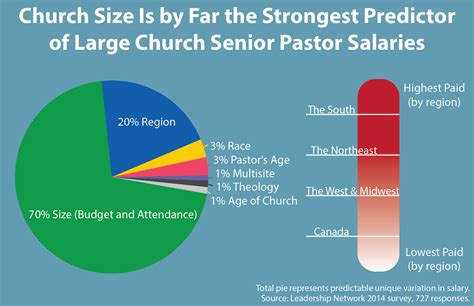The compensation of preachers, also known as pastors or ministers, can vary significantly depending on several factors, including the size and type of church, denomination, location, level of experience, and educational background. It’s essential to understand that the role of a preacher is not only spiritual but also involves administrative, pastoral, and community responsibilities, which can influence their compensation.
Factors Affecting Preacher Compensation
Church Size and Type: Preachers serving in larger churches tend to receive higher salaries due to the greater financial resources available. The type of church, whether it’s a megachurch, a small community church, or part of a specific denomination, can also impact salary levels.
Denomination: Different Christian denominations have varying policies and budgets for compensating their clergy. Some denominations are more affluent and can offer higher salaries and better benefits.
Location: The cost of living in different parts of the country or world can significantly affect the preacher’s salary. A preacher in a high-cost area like New York City may receive a higher salary than one in a lower-cost area in the Midwest, even if the churches are similar in size.
Level of Experience: Like most professions, experience can play a crucial role in determining salary. More experienced preachers, especially those with a proven track record of growing congregations or providing strong spiritual leadership, may command higher salaries.
Educational Background: The level of education, particularly if a preacher holds a Master of Divinity (M.Div.) or another advanced degree, can influence their compensation. Advanced degrees often require significant investment and demonstrate a higher level of expertise and commitment to their calling.
Specific Responsibilities: The scope of responsibilities can vary widely among preachers. Some may have additional roles such as teaching, counseling, or administration, which can impact their compensation.
Salary Ranges
While it’s challenging to provide an exact figure due to the wide range of factors involved, here are some general salary ranges for preachers in the United States:
- Small Church (less than 100 members): 25,000 - 40,000 per year
- Medium Church (100-500 members): 40,000 - 70,000 per year
- Large Church (500-2,000 members): 60,000 - 110,000 per year
- Mega Church (more than 2,000 members): 80,000 - 200,000 per year or more
These figures are approximate and can vary based on the specific circumstances of the church and the preacher. Additionally, these figures do not include non-monetary benefits such as housing allowances, health insurance, retirement plans, and educational support, which can significantly add to the total compensation package.
Conclusion
The role of a preacher is multifaceted, involving spiritual leadership, community building, and often administrative tasks. While the financial compensation can vary widely, it’s clear that the calling to serve as a preacher is not typically driven by monetary reward but by a deep commitment to faith and community. Understanding the factors that influence preacher compensation can provide insight into the complexities of this vital role in religious communities.
How does the location of a church affect a preacher's salary?
+The location of a church can significantly affect a preacher's salary due to variations in the cost of living. Churches in areas with a higher cost of living may offer higher salaries to ensure their preachers can afford to live comfortably in the area.
What role does experience play in determining a preacher's salary?
+Experience is a crucial factor in determining a preacher's salary. More experienced preachers are likely to receive higher salaries due to their proven ability to provide effective spiritual leadership and possibly grow church membership.
How do different denominations impact preacher salaries?
+Different Christian denominations have varying policies and budgets for clergy compensation. Some denominations are more affluent and can offer higher salaries and better benefits to their preachers compared to smaller or less financially robust denominations.
In conclusion, while financial compensation is an important aspect of any profession, including that of a preacher, it’s essential to recognize the broader context of service, community, and spiritual leadership that defines this role. The variations in salary reflect not just the economic realities but also the diverse nature of religious communities and the multifaceted responsibilities of preachers within those communities.



